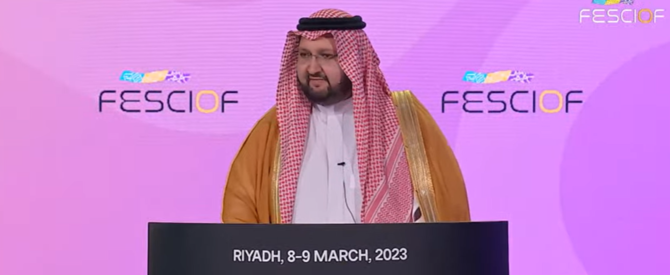https://arab.news/cnr3z
- Saudi Arabia’s Prince Abdulaziz bin Talal bin Abdulaziz Al-Saud said it was imperative to ‘provide opportunities’ for youths in these sectors.
DUBAI: In his introductory keynote speech at the Future of Education, Science and Culture International Organizations Forum, which began on March 8, Saudi Arabia’s Prince Abdulaziz bin Talal bin Abdulaziz Al-Saud said it is imperative to “provide opportunities” for youths in these sectors.
“We are witnessing an unprecedented period of technological advancement that is transforming every aspect of our lives. The younger generation is particularly affected by these developments and (is) eager to be part of the change,” he said. “Students from all over the world can now share knowledge and collaborate on projects through online platforms. It is our responsibility to harness this energy and provide opportunities for young people to contribute developments to our society.”
Prince Abdulaziz told the audience at FESCIOF that Saudi Arabia “is a role model” in this regard.
“Since 2005, the Kingdom has sent over 300,000 students (on) scholarships to different countries in the world: the US, Canada, Europe, Australia, Japan, China and elsewhere.”
These students are now leaders in Saudi Arabia’s private and public sectors, he added.
Reducing the widening gap between developing and developed societies is essential, according to Prince Abdulaziz.
“The development of education is the key to transition societies from agricultural and industrial economies to the economy of services and information,” he said.
He explained it is also the role of development banks and entrepreneurs to support education projects in emerging economies.
“The support is essential to reduce inequality, develop infrastructure, improve teacher qualifications and reform the management of education systems,” Prince Abdulaziz added.
Following his keynote speech, there was a panel on youth inclusion in the education, science, technology and culture sectors, moderated by Sallyann Della Casa, founder and chief identity hacker at GLEAC.
The panelists included Dr. Webber Ndoro, director-general of the International Centre for the Study of the Preservation and Restoration of Cultural Property; Maral Jule Bedoyan, education and learning resources manager at the Louvre Abu Dhabi; and Okan Dursun, founding member of Twin Science, the world’s first educational technology company.
Bedoyan kicked off the discussion by explaining how the youths of today can learn from the museum’s artwork.
“Participatory learning and experiential learning tools are used at the museum,” she said, adding that technology plays a complementary role to storytelling, which is a primary educational tool used at the Louvre.
Dr. Ndoro said ICCROM was created by UNESCO and its main purpose is “to look after world heritage sites...
“ICCROM can help unemployment in youth, and heritage should be seen as essential for their livelihood,” he explained. “We see heritage as something that can provide answers to some issues…provide jobs, provide employment, provide entrepreneurship…The youth has to be a major stakeholder in what we do.”
Dursun from Twin Science said today’s youth are the “first and last generation to work on climate change action,” emphasizing the importance of the younger generation’s role in addressing this challenge.
He explained that Twin Science is “empowering children with stem skills” and helping them learn about sustainability and other environmental topics.
Dursun plans to incorporate all 17 of the UN’s Sustainable Development Goals into Twin Science’s mission. “We can put our hearts to science as it will help create a better future and world for us,” he said.
FESCIOF is taking place from March 8-9 and will focus on topics that include identifying new ways to measure progress in efforts to achieve the UN’s SDGs; the inclusion of youths in education, science, technology and culture; enhancing digital connectivity; the future of digital; innovation in international organizations; and investment and financial solutions.
The forum is one of several major events hosted in Riyadh in recent months, which have included the second edition of the LEAP tech conference and the International Conference and Exhibition for Science.

